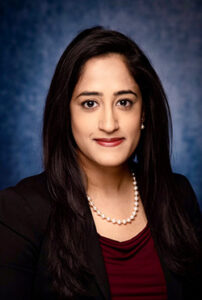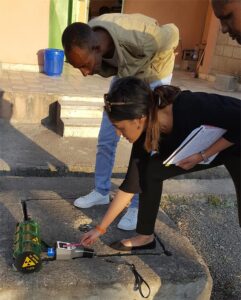
Anagha Iyengar
Anagha Iyengar, who earned both her master’s and doctoral degrees in nuclear engineering from UT, has been honored with a 2023 Early Career Award from the Institute of Nuclear Materials Management (INMM).
The INMM is a global nonprofit organization dedicated to ensuring the safe stewardship of nuclear materials around the world. Since its start in 2013, the yearly INMM Early Career Award has honored up to three members under the age of 35 who have made “outstanding” achievements in nuclear materials management.
“It’s a great honor to be one of the recipients of the award,” said Iyengar, who currently works as a Deputy Program Director within the US Department of Energy’s (DOE) National Nuclear Security Administration (NNSA). “Many accomplished experts have received this award, including the NNSA’s Deputy Administrator for Defense Nuclear Nonproliferation, Corey Hinderstein.”
Iyengar’s nomination was initiated by her first NNSA mentor, Arden Dougan. Her graduate school mentors, UT Professor and United Cleanup Oak Ridge (UCOR) Fellow Jason Hayward and Oak Ridge National Laboratory (ORNL) Group Leader Paul Hausladen, contributed letters endorsing her nomination.
“Anagha is certainly worthy of this honor based on my experience with her,” Hayward said. “When the opportunity arises, Anagha emerges as a leader.”
Indeed, when Iyengar worked in the NNSA’s Office of International Nuclear Safeguards, she took charge of a congressionally mandated program to assess the international safeguarding implications of new nuclear reactor designs.
“It was a unique and rare experience to build an entire program from the ground up,” she said. “The program is still going strong, and my hope is that it will continue to grow and create impact globally.”
Iyengar has a talent for founding promising long-term projects. Her doctoral work at UT and ORNL culminated in a proposal for a new, compact imaging device to help detect missing or fake fuel rods in nuclear fission fuel assemblies slated for long-term storage.
Now Mairead Montague, one of Hausladen and Hayward’s current PhD students, is building a working imager using Iyengar’s design. She will be demonstrating the imaging of a mock fuel rod assembly this fall.
“There is significant international interest in this novel and one-of-a-kind imager,” said Hayward. “In addition to better monitoring assemblies in dry storage, it might give us a new capability to estimate the amount of energy produced by each rod in a fuel assembly.”

Iyengar and agents from the Ethiopian Radiation Protection Authority work to identify unknown sources of radiation (2019).
Iyengar was excited to learn about her research legacy at UT.
“I think it’s fantastic that the work is continuing,” she said, “and that Mairead is helping bring this unprecedented concept to life!”
Iyengar received her bachelor’s degree in nuclear engineering from the University of California, Berkeley, in 2012. She came to the UT Department of Nuclear Engineering because of its national reputation and its proximity to ORNL.
“I am very grateful for the mentorship and guidance I received from Dr. Hayward, Dr. Hausladen, and all the other brilliant national security and nonproliferation experts I got to work with,” she said. “Nuclear security problems are complicated and evolve continuously, so we need to be innovative. Perseverance, problem solving, root cause analysis, and developing creative solutions are all skills I learned during my time at UT and ORNL that I regularly apply in my current position.”
Iyengar now acts as a liaison between policymakers and researchers, connecting the dots between the people who identify new problems and the people who have the resources to address them.
“It is excellent to have our graduates working in both impactful laboratory research and in enabling positions in government,” said Hayward. “Program managers like Anagha help guide national research and development and support laboratory investigators in developing impactful technologies.”
While she is no longer conducting research herself, Iyengar is always looking out for new opportunities and needs in the nuclear safeguard sector.
“We are at a unique point in history,” she said, “where countries around the world are looking towards nuclear energy to achieve carbon-free energy security. With the predicted spread of nuclear material, we need the verification and accounting resources to assure the safety of the public environment, security of the material and site, and safeguards of these technologies being pursued.
“While the impact of nuclear security on individuals’ daily lives may not always be apparent, the underlying goal of preventing nuclear terrorism and ensuring public safety contributes to a safer and more secure world for Americans and citizens worldwide.”
Contact
Izzie Gall (865-974-9387, egall4@utk.edu)